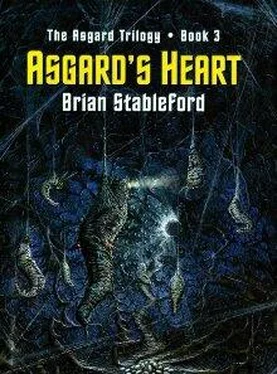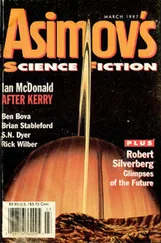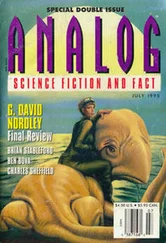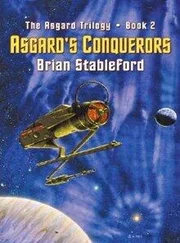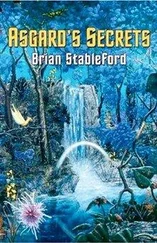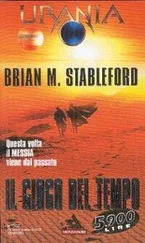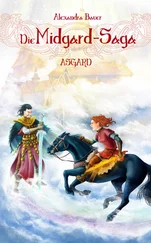“You ask me who I am. I can only say that in your mind’s eye I am the one who guided the hand of the blind slayer of Balder; I am the one who freed the great wolf Fenrir and rode with him at the head of an army drawn from the Underworld where the dead denied Valhalla groaned beneath the burden of their misery; I am the one whose call roused the fire giants and plotted the course of the ship of ghosts—you must call me Loki. Are you any wiser now, small creator of gods? Do you understand now what your little thread signifies within the infinite tapestry woven by the Norns? No, my human friend, you do not. You understand nothing—nothing at all.”
“Forget Loki, then,” I said. “Strip away the mythic mask. You’re one of the invaders of the macroworld: a tapeworm, programmed to disrupt and destroy. Why are you trying to destroy Asgard?”
He smiled. “The macroworld is in danger,” he said, coolly, “but we do not intend that it should be destroyed. We have other plans for it. We have sent our ambassadors to save it, and they will do so, unless your fleshly self intervenes. If anyone intends to let the starlet go nova, it is the ones who oppose us—the guardian gods of Asgard. What passenger they have placed in your counterpart’s brain we cannot tell, but we know only too well that those who fight against us would rather blow the macroworld to atoms than let us possess it. You do not know what kind of beings they are who have summoned you to this fight. You do not understand the game in which you are a pawn, and you owe no loyalty to those who have used you.”
He seemed to be working hard to make that point, and I wondered whether my acceptance of ignorance and confusion, or some fatal weakening of my resolve, was yet necessary to the final victory of the forces which were labouring so hard in the work of my destruction.
“You switched off the power,” I accused him. “It was the invaders, not the gods made by the builders, which sought to condemn thousands of worldlets to death.”
“Yes,” he said, without hesitation. “We switched off the power. The Isthomi’s probing disrupted the stalemate that had long held us impotent, and we took advantage of it. But the robots which penetrated the starshell were of necessity very crude, and that was the only thing which they could achieve—the real space inside the starshell is too hazardous for our kind of being. We have no flesh-and-blood legions at our disposal, as the guardian gods once had, but the balance of power is more equal now. When we struck again at the Isthomi, we seized our chance to conscript a little flesh to our own cause. When we have won our victory, you may be sure that the power will be returned to the levels; we have need of Asgard, if we can only dispossess its jealous gods. But you, I fear, must be destroyed. We cannot tell what the clever Aesir may have made of you, and we must protect ourselves.”
There was an obvious hypocrisy in his regretfulness. He still wasn’t absolutely certain that I was harmless. He was still trying to delay while the forces of corruption worked their careful way with my rotting body. I knew that I couldn’t move, but I also knew that I could work magic. I had helped to calm a storm with the power of my voice, and though I knew no spells or words of power, I knew that there must be some key to unlock the forces in my mind.
“Loki died too,” I whispered—and my voice, though weak, sounded oddly loud over the clamour of the crowd who were waiting to see me killed. “On the field of Ragnarok, they all died! When it all began again, there was a new race of gods, unknown save for Balder, whose murder was undone. You’re all going to die. Do you hear me— you’re all going to die!”
My voice rose as I spoke to what I intended to be a stentorian shout, but it came out more like a cracked shriek. The effect was entirely ruined, and the person who called himself Loki, far from being intimidated by my defiant curse, laughed again, with every sign of genuine amusement. The crowd joined in with him, and suddenly the random noise generated by the throng coalesced into a single continuing sound: the sound of joyous laughter.
I burned with humiliation, and I tried with all my might to focus every last vestige of my waning spirit into a hot surge of pure hatred. I was certain that I had the power to raise my arm, to fight back. In that moment, the sheer magnitude of my rage made me feel like a god—like one whose power simply could not be denied.
But passion wasn’t enough. My arm wouldn’t come up, and when I looked down to command my flesh with the power of my gaze, I saw why. The maggots were already busy in my flesh. They had devoured me almost to the bone. Where once there had been white skin there was now a grey tegument like ragged cloth, pallid and writhing, foul to behold.
Helplessly, I looked up again into the vicious grey eyes of my accuser and executioner.
He had a sword in his hand now, whose mirror-bright blade shone like liquid fire in the angry sunlight. As he raised it to sweep it around in a deadly arc his lips drew back from his teeth in a way that linked him incontrovertibly with the predator whose appearance he had worn in his previous manifestation, when I had engaged him in debate before. Perhaps it was then that I had unwisely given him the opportunity to learn to understand me.
He was Loki the traitor; he was Amara Guur; he was the devil incarnate—and I had nothing left with which to resist his evil.
He reached out with his left hand to grab a handful of my scaly hair, and held me tight while he brought the sword across to cut cleanly through my neck.
My rotting body fell to the ground, seared by the heat of the sun-warmed stone, while he held my severed head aloft, displaying it to the assembled crowd. He let loose a great wordless howl of triumph, which said as clearly as I might have wished that he had still feared me, and that there had been something I could have done, if only I had known the way, but that I had failed to discover it.
At first glance, they didn’t look like wings.
In fact, the things which Urania pulled out of the bags she’d thoughtfully packed for us looked so much like screwed-up balloons that I thought I’d got hold of the wrong end of the stick and we were going down Montgolfier-fashion. No such luck—they were wings all right, but they were made out of artificial organics, and they spent their inactive time huddled into tight little balls.
“What exactly are we supposed to do with these things?” I asked Urania, as I took up one of these unpromising objects and weighed it in my hand. It felt distressingly light and fragile.
“Think of them as another kind of robot,” she suggested. “They are not so very different from the tiny things which we used to carry cameras and poison darts down to this level. But these are adapted for the purpose of carrying humanoid beings. It will not be necessary for you to do anything—they will hold you securely, and have an expertise of their own which will enable you to glide down safely. They can cope with any movements which you make, but it would be as well if you tried to remain still, spreading out your limbs horizontally until you touch down on the shell which surrounds the starlet.”
Susarma Lear was no more enthused than I by the sight of these creations, which certainly seemed less elegant in design than anyone could have anticipated. As inventors went, the Isthomi were easily a match for the legendary Daedalus—their home level had a labyrinth to put his to shame, and minotaurs would have been a mere finger-exercise for their biotech skills—but I remembered only too well what had happened to poor Icarus.
“Do not be afraid,” said Urania to Susarma Lear. “There is nothing to fear. At least, there is nothing to fear from the fall itself.”
Читать дальше
